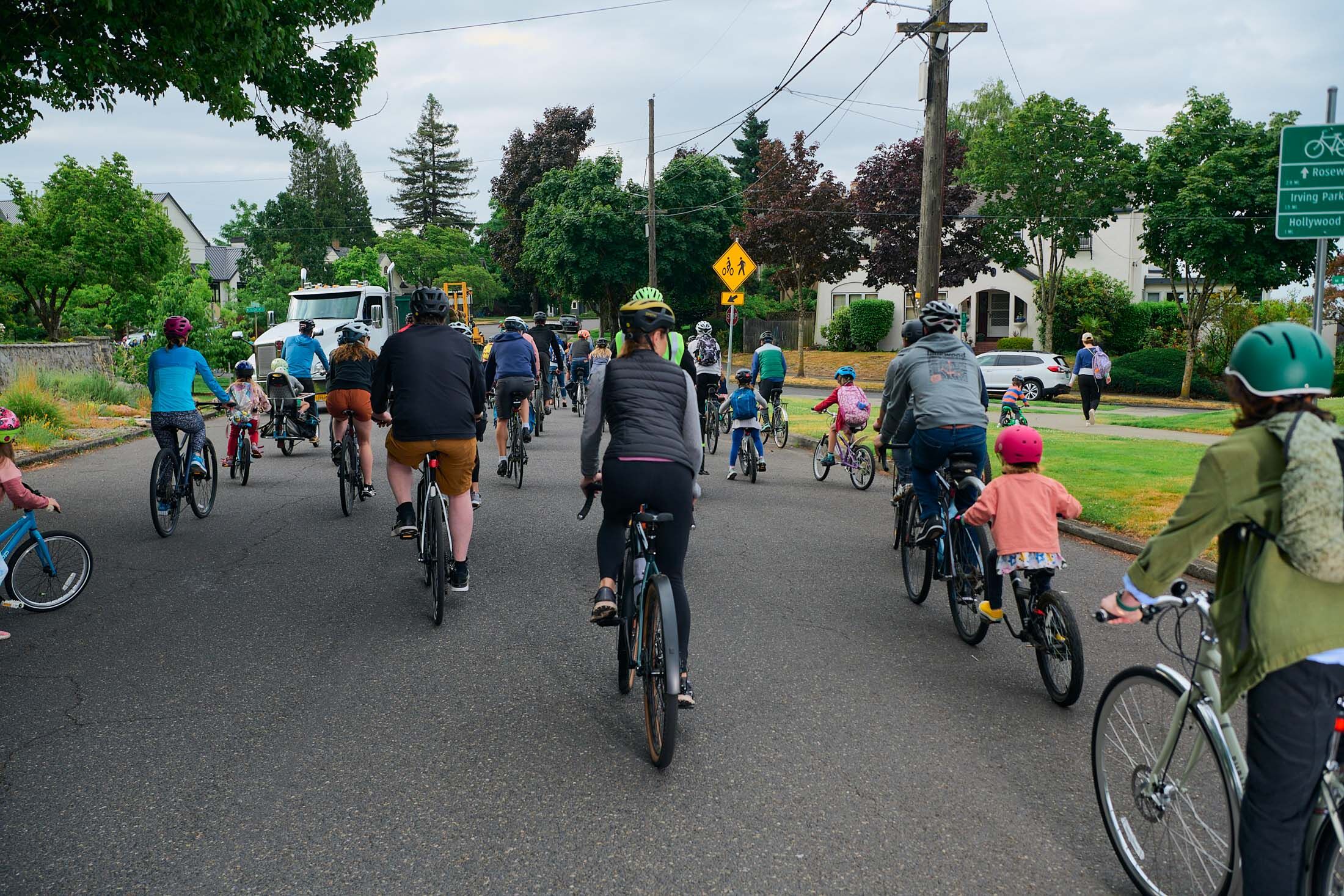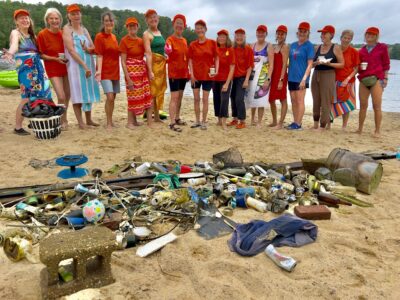(Bloomberg) —
Ben Block’s family does all the things a climate-conscious brood can. They try to minimize driving, recently switched to an electric oven, and are constantly gut-checking purchases. When Block’s five-year-old son asked for a new toy truck earlier this year, the 37-year-old calibrated his response carefully: Cheap plastic toys are fun, he conceded, but they tend to get thrown out quickly. How about a long-lasting Lego set instead?
Still, Block worries. He worries about bringing up children in a world beset by environmental crises, what that world will look like and how difficult it might be to live in. He worries about his children’s children. Block worries about global warming so much that five years ago he and his friend Jason Sandman co-founded an advocacy group called Climate Dads. Its first gathering took place in a Philadelphia park on Father’s Day 2018.
“The world’s environmental challenges are not my children’s fault,” says Block, who lives in Philadelphia and works for an engineering company. “Still, I try to meet them where they are — encouraging them to reduce unnecessary consumption, focusing on toys and games that they’ll find rewarding over the long term. It’s a battle.”
Climate Dads had no trouble recruiting: Within two years, the group had grown to roughly 800 fathers in 20 US cities. They ran meetups at nature reserves and affixed “This Place Will Be Water” stickers in neighborhoods impacted by sea-level rise, among other initiatives. Dozens of the dads also penned public testimonials. “Bringing you into this world was my greatest achievement,” Block wrote in an open letter to his son. “Now I need to make sure you can navigate the difficulties that lie ahead.”
Block and Sandman recruited 800 fathers to their group, but climate dads are everywhere. Like sports dads, grill dads and car dads before them, climate dads are a little bit nerdy, a little bit obsessive and, sometimes, a little bit embarrassing. They care deeply about the ailing planet, and process that passion by pushing their families to make behavioral changes, geeking out on decarbonization and coordinating with fellow obsessives. They aren’t fatalists — no doomer dads allowed — but function more like mavens, a Malcolm Gladwell term for people both adept at gathering information and excellent at sharing it.
“It taps into something which I think is quite profound,” says Peter Olivier, a 38-year-old self-described climate dad, “which is how to be a hopeful masculine figure in the modern era.”
Olivier, who lives in New York and is father to a six-year-old, works for a carbon dioxide removal company. He characterizes a climate dad as “all my friends I went to college with.” Many of those friends also work in renewable energy or sustainability, and Olivier admits that his circle is a bit of a bubble. Still, when he wrote a paean to climate dads on Twitter in March, dozens of people responded with some version of, “That sounds like me.”
“We’re all like, ‘Oh yeah, I was able to insulate the basement,’ or ‘I was able to put in a heat pump,’ or, ‘We’re thinking about getting rooftop solar, how did that go for you?’” Olivier says. “This is what we all talk about.” When Olivier got solar panels on his house last June, “it was like the only thing I talked about for three months.”
new kind of dad just dropped:
✨climate dad✨
this is in addition to the traditional options of 1) great wars dad and 2) grill dad
should this type of dad appeal to you, you can start now by talking exclusively about heat pumps— Peter Olivier (@PeterOlivier) March 20, 2023
In some ways, the climate dad is nothing new — a few decades ago, he’d be reminding everyone to keep the air conditioning on low and turn the lights off when leaving a room. But consumer research has found that women tend to be more engaged in recycling and reducing water and energy use at home. Most household goods are marketed to women, too.
That creates a risk that “greening the family” becomes another task for overburdened moms, says Elizabeth Cripps, a philosopher and senior lecturer at the University of Edinburgh, whose most recent book, Parenting on Earth, explores the moral quandary of parenting in a climate crisis. “I don’t think we can make sense of what it means to be a good parent today without thinking about what responsibilities we have to our own kids in the face of climate change,” Cripps says.
To that end, the more recent cohort of climate dads are part of a generation that approaches fatherhood differently. Between 1965 and 2011, men’s time spent caring for their children doubled in the US, according to Pew Research analysis (though to just two hours per week). The share of US families with a stay-at-home parent who’s male hit 5% last year, up from less than 2% in 1994. In the UK, men now spend about 65% as much time as women on unpaid childcare — versus 50% in 2015 — and the number of stay-at-home dads is up by a third since the Covid-19 pandemic.
“Overall, a dad in 2023 is doing a whole load more caregiving than a dad did in 2013 and 2003,” says Jeremy Davies, head of impact and communications at the Fatherhood Institute, a UK charity and research group. “Something is shifting.”
Even high-profile climate dads have redirected their careers and personal lives around environmental anxieties. At the end of last year, Sebastian Vettel, a father of three, quit full-time Formula 1 racing, citing his concerns about climate change. “I feel we live in very decisive times and how we all shape these next years will determine our lives,” Vettel said at the time.
In 2021, Blur frontman Damon Albarn, who has an adult daughter, released an album inspired by his experience of watching “climate change in action” in Iceland. Albarn also installed heat pumps at his home in Devon, England, ruffling feathers on the local parish council.
There are even climate grandads. British television presenter Kevin McCloud says becoming a grandfather sharpened his focus on what’s at stake with the planet. McCloud’s new TV show, The Big Climate Fight, emphasizes practical solutions. “It’s more likely we’re going to get it very badly wrong than very right,” he says. “That delivers this sense of urgency. There’s also a great hope.”
Like gearhead dads, some climate dads get sucked in by technology: In 2023, obsessively telling your family which time of day the app says is best for running the washing machine based on the kilowatt-hours generated by the rooftop solar panels is the new reminder to turn down the thermostat. One survey in May by US outlet Heatmap News found that fathers were more likely than mothers or childless men to be in favor of wind turbines and geothermal energy in their communities.
“It taps into something which I think is quite profound, which is how to be a hopeful masculine figure in the modern era.”
Other guys simply gravitate toward the climate-dad lifestyle. The same Heatmap poll found fathers more likely to be keen on electric cars, e-bikes and walking instead of driving.
Sam Balto, a 37-year-old physical education teacher in Portland, Oregon, began his journey to climate dad-dom by searching for a way to get kids to exercise. Last April, Balto started a weekly “bike bus” — a flotilla of student cyclists who travel to the nearby elementary school with adult volunteers. He estimates 30% of participating families would have otherwise driven a car to school.
“Climate change is seen as this negative thing that’s being done to us, but we can do some really creative and fun things to address it,” says Balto, who has sons aged five and two. “I think the bike bus provides an opportunity for dads, for males, to show up and support their community where they might not otherwise know how to.”
Balto also sees his role as a protective one. Navigating a car-centric city with children in tow makes it even clearer how unsafe roads are for pedestrians and cyclists.
“If you’re walking down the street with your children and you see huge cars and think, ‘It isn’t safe here,’ it’s understandable that you would go out and buy a huge car, too,” he says. “But that’s not what a climate dad does.”
Being a climate dad isn’t always easy: By definition, it’s an attempt to create something productive out of a combination of existential anxieties. In 2021, an episode of the podcast This American Life talked to the kids of Michael Foster, a US-based activist whose dedication to the planet estranged him from his family. Foster pushed his children to give speeches about climate change, yelling at them when (in his opinion) they didn’t do it right. He was ultimately sent to prison for turning off an oil pipeline valve — after having promised his family that he would stop climate activism.
“He put so much of himself into it and wanted me to put so much of myself into it,” Foster’s daughter Stella said on the podcast. “I really got the feeling that his love was completely conditional.”
Leo Murray, a 47-year-old climate activist in London, has also struggled to blend fatherhood and advocacy. In 2009, he turned down an invite to protest with friends at COP15 in Copenhagen, citing a baby on the way. Around the same time, Murray quit 10:10, a campaign he’d founded to engage the public in climate solutions. He stopped going to activist meetings entirely, his first pullback since falling down the “climate rabbit hole” and co-founding Plane Stupid, a direct-action group focused on blocking airport expansions, five years earlier.
“I couldn’t hold these two enormous things together at the same time,” Murray says of parenthood and activism. “I couldn’t keep staring into the void. I was thinking about it absolutely all the time, and I couldn’t. There wasn’t enough of me to go around.”
Murray’s son was born in 2010, and a daughter two years later. Since then, he’s found his way back to the climate fight. In early 2019, his family launched a successful campaign for a bicycle lane in west London, which they now use daily. This April, the Murray clan even attended London’s Extinction Rebellion Big One march — a family-friendly protest that was more face paint and dancing than soup and superglue.
“What you don’t want to do is inculcate a sense of despair in your children about their future,” Murray says. “What I’m trying to do is build a sense in them of their own agency and their own ability to change the world.”
Sometimes that means managing expectations. Every year, Murray’s extended family flies to a far-flung location for a vacation, and every year he and his wife decline, citing the flights’ carbon footprint. It’s a sacrifice Murray has struggled to explain to his daughter: “She would be jetting around the world, if it was up to her.”
This year, though, the whole family reached a compromise. Everyone’s going to Barcelona — by train.
To contact the author of this story:
Olivia Rudgard in London at orudgard@bloomberg.net
© 2023 Bloomberg L.P.





